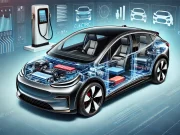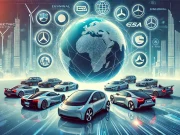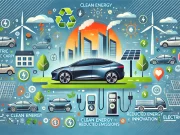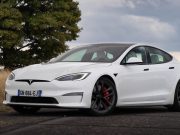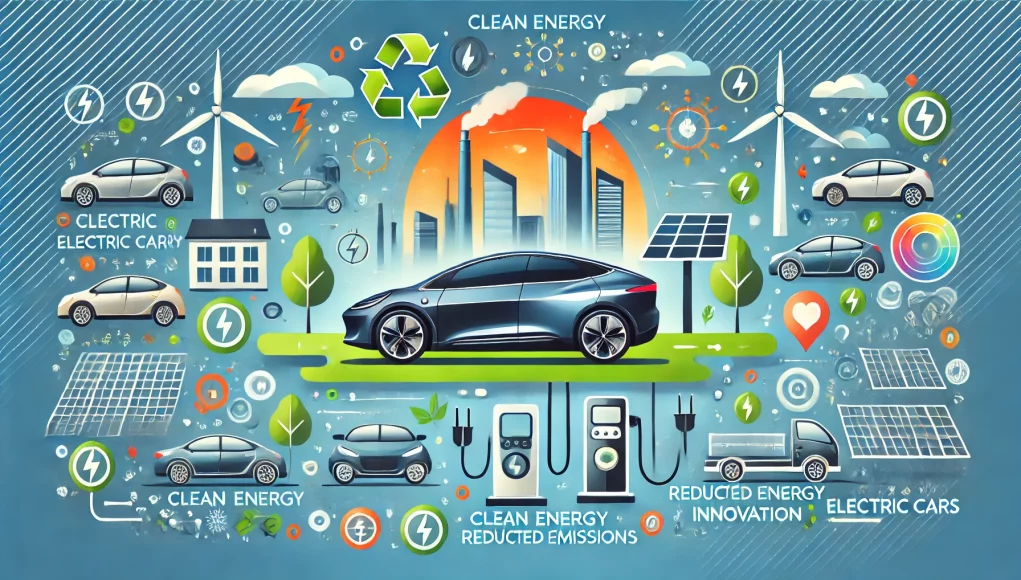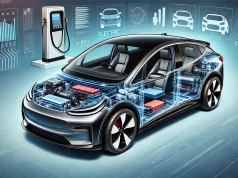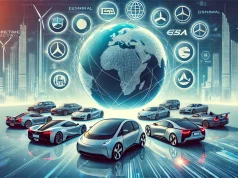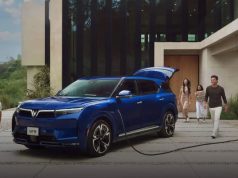Electric cars (EVs) have emerged as a transformative force in the automotive industry, offering a sustainable alternative to traditional internal combustion engine vehicles. As environmental concerns escalate and technology advances, electric vehicles are becoming increasingly integral to global transportation strategies. This comprehensive article explores the myriad benefits of electric cars and provides a detailed assessment of their future globally and in Southeast Asia, with a focus on Vietnam, Cambodia, and Laos.
Introduction
Electric vehicles represent a significant shift toward cleaner, more efficient transportation. Powered by electricity stored in rechargeable batteries, EVs eliminate tailpipe emissions and offer numerous economic and performance advantages. The global push for electrification is not just a trend but a critical component in combating climate change and fostering sustainable development.
Environmental Benefits
Reduction in Carbon Emissions
One of the most compelling benefits of electric cars is their potential to significantly reduce greenhouse gas emissions. EVs produce zero tailpipe emissions, meaning they do not emit carbon dioxide (CO₂) or other harmful gases during operation. This reduction contributes to lowering the overall carbon footprint of transportation, a sector that accounts for a substantial portion of global emissions.
Improved Air Quality
Electric vehicles help improve air quality, particularly in urban areas plagued by pollution. By eliminating exhaust emissions, EVs reduce the concentration of nitrogen oxides (NOx) and particulate matter (PM2.5), which are linked to respiratory and cardiovascular diseases. Cleaner air leads to healthier populations and reduced healthcare costs.
Integration with Renewable Energy
EVs can be powered by electricity generated from renewable sources such as solar, wind, and hydroelectric power. This integration amplifies their environmental benefits, making electric cars a cornerstone in the transition to a sustainable energy future.
Economic Benefits
Lower Fuel Costs
Electricity is generally cheaper than gasoline or diesel on a per-mile basis. EV owners can save significantly on fuel costs, especially when charging during off-peak hours or using residential solar panels. Over the vehicle’s lifetime, these savings can offset the higher initial purchase price of an electric car.
Reduced Maintenance Costs
Electric cars have fewer moving parts than their internal combustion counterparts, resulting in lower maintenance requirements. There is no need for oil changes, and components like brakes experience less wear due to regenerative braking systems. This simplicity translates to reduced service costs and increased vehicle longevity.
Government Incentives
Many governments worldwide offer financial incentives to encourage the adoption of electric vehicles. These incentives include tax credits, rebates, reduced registration fees, and exemptions from congestion charges. Such policies make EVs more accessible and financially attractive to consumers.
Performance and Driving Experience
Instant Torque and Acceleration
Electric motors deliver instant torque, providing rapid acceleration and a responsive driving experience. This immediate power enhances performance, making EVs competitive with or superior to traditional vehicles in terms of speed and agility.
Quiet Operation
The absence of an internal combustion engine results in a quieter ride. Reduced noise pollution enhances driver comfort and contributes to more peaceful urban environments.
Advanced Technology Integration
Electric vehicles often feature cutting-edge technology, including advanced driver-assistance systems (ADAS), over-the-air software updates, and sophisticated infotainment systems. These technologies improve safety, convenience, and overall driving enjoyment.
Social Benefits
Energy Independence
By reducing dependence on imported oil, electric vehicles enhance national energy security. Electricity can be produced domestically from various sources, including renewables, reducing exposure to volatile global oil markets.
Job Creation
The growth of the electric vehicle industry stimulates job creation across multiple sectors, including manufacturing, infrastructure development, research and development, and renewable energy production.
Accessibility and Equity
As technology advances and economies of scale reduce costs, electric vehicles become more affordable. Initiatives like shared mobility services and public electric transportation systems increase accessibility for a broader segment of the population.
Challenges and Solutions
Charging Infrastructure
Challenge: Limited availability of charging stations, particularly in rural areas, can hinder the practicality of owning an electric vehicle.
Solution: Governments and private enterprises are investing in expanding charging networks, including fast-charging stations along major highways and in urban centers. Innovations like wireless charging and battery-swapping technologies are also being explored.
Battery Longevity and Recycling
Challenge: Concerns about battery lifespan and the environmental impact of battery disposal.
Solution: Advances in battery technology are improving durability and capacity. Recycling programs are being developed to recover valuable materials like lithium and cobalt, reducing environmental impact and resource dependency.
Higher Initial Purchase Price
Challenge: Electric vehicles often have a higher upfront cost compared to traditional vehicles due to expensive battery technology.
Solution: Costs are decreasing as battery production scales up and technology improves. Government incentives and subsidies further reduce the financial barrier for consumers.
The Future of Electric Cars: Global and Southeast Asian Perspectives
Global Outlook
The future of electric cars is promising, driven by a convergence of technological innovation, environmental necessity, and supportive policy frameworks.
- Technological Advancements: Breakthroughs in battery technology, such as solid-state batteries, are expected to increase energy density, reduce charging times, and lower costs.
- Policy Support: Many countries are setting ambitious targets to phase out internal combustion engine vehicles. For example, the European Union aims to have at least 30 million zero-emission cars on its roads by 2030.
- Market Growth: Global electric vehicle sales have been steadily increasing, with projections indicating that EVs could make up a significant percentage of new car sales by 2040.
Southeast Asia’s Emerging Market
Southeast Asia presents a unique opportunity for electric vehicle adoption due to its rapid urbanization, economic growth, and increasing environmental awareness.
Vietnam
Vietnam is taking proactive steps to embrace electric mobility.
- Government Initiatives: Policies are being implemented to encourage EV adoption, including tax incentives and investment in charging infrastructure.
- Local Industry Growth: Vietnamese automaker VinFast is expanding its electric vehicle lineup, aiming to compete both domestically and internationally.
- Public Awareness: Efforts to educate consumers on the benefits of EVs are gaining momentum, fostering greater acceptance.
Cambodia
Cambodia is gradually entering the electric vehicle market.
- Policy Developments: The government is considering incentives to reduce import taxes on electric vehicles and promote clean energy.
- Infrastructure Challenges: While still limited, there is growing interest in developing charging stations, particularly in urban areas.
- International Support: Partnerships with international organizations are aiding in the transition towards sustainable transportation.
Laos
Laos has the potential to integrate electric vehicles effectively due to its abundant renewable energy resources.
- Renewable Energy Advantage: With significant hydroelectric power generation, Laos can utilize clean electricity to power EVs, maximizing environmental benefits.
- Regional Collaboration: Engagement in ASEAN initiatives supports infrastructure development and knowledge sharing.
Expert Assessment on the Future of Electric Cars
According to industry experts, the trajectory of electric vehicle adoption will depend on several critical factors:
- Infrastructure Development: Expanding charging networks is essential to alleviate range anxiety and make EVs a practical choice for consumers.
- Economic Viability: Continued reductions in battery costs and economies of scale in manufacturing will make electric vehicles more competitively priced.
- Regulatory Environment: Strong government policies, including incentives and regulations that favor electric over internal combustion vehicles, will accelerate adoption.
- Consumer Acceptance: Education and awareness campaigns highlighting the environmental and economic benefits of EVs are crucial.
Southeast Asia’s Potential Growth
Experts predict that Southeast Asia could become a significant market for electric vehicles if challenges are addressed effectively.
- Urbanization: As cities grow, the need for sustainable transportation solutions becomes more pressing.
- Two-Wheeler Electrification: Electrifying motorcycles and scooters, which are prevalent in the region, offers immediate environmental benefits.
- Regional Cooperation: Collaborative efforts among ASEAN countries can standardize regulations, infrastructure, and technology sharing.
Conclusion
Electric cars offer substantial benefits that extend beyond environmental sustainability to include economic growth, technological innovation, and social advancement. The global shift toward electric mobility is gaining momentum, supported by technological progress and an increasing commitment to combating climate change.
In Southeast Asia, countries like Vietnam, Cambodia, and Laos stand at the cusp of this transformation. By addressing infrastructure challenges, implementing supportive policies, and fostering consumer acceptance, these nations can harness the full potential of electric vehicles.
FAQs
1. What are the main benefits of electric cars?
Electric cars provide environmental advantages by reducing emissions, economic benefits through lower fuel and maintenance costs, enhanced performance with instant torque and quiet operation, and social benefits including energy independence and job creation.
2. How does the future of electric cars look globally?
The future of electric cars is bright, with increasing adoption driven by technological advancements, supportive government policies, and growing environmental awareness. Electric vehicles are expected to represent a significant portion of new vehicle sales in the coming decades.
3. What challenges do electric cars face in Southeast Asia?
Challenges include limited charging infrastructure, higher initial costs, and a lack of consumer awareness. However, these are being addressed through government initiatives, private investment, and educational campaigns.
4. Why is electrifying two-wheelers important in Southeast Asia?
Two-wheelers are a primary mode of transportation in Southeast Asia. Electrifying motorcycles and scooters can significantly reduce emissions and pollution, improve air quality, and offer cost savings to riders.
5. How are governments supporting electric vehicle adoption?
Governments are providing incentives such as tax credits, subsidies, and reduced registration fees, investing in charging infrastructure, setting regulatory targets to phase out internal combustion engines, and conducting public awareness campaigns.
By embracing electric vehicles, societies can move toward a more sustainable, efficient, and environmentally friendly transportation system. The combined efforts of governments, industries, and consumers are essential in driving this transition and realizing the full benefits of electric mobility.

